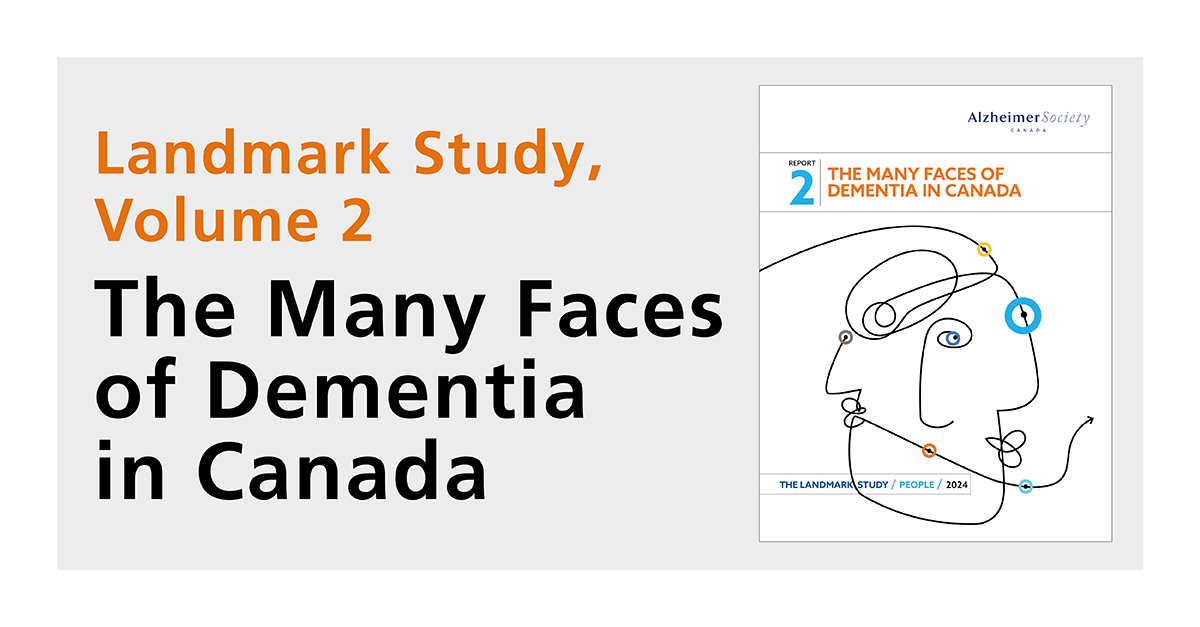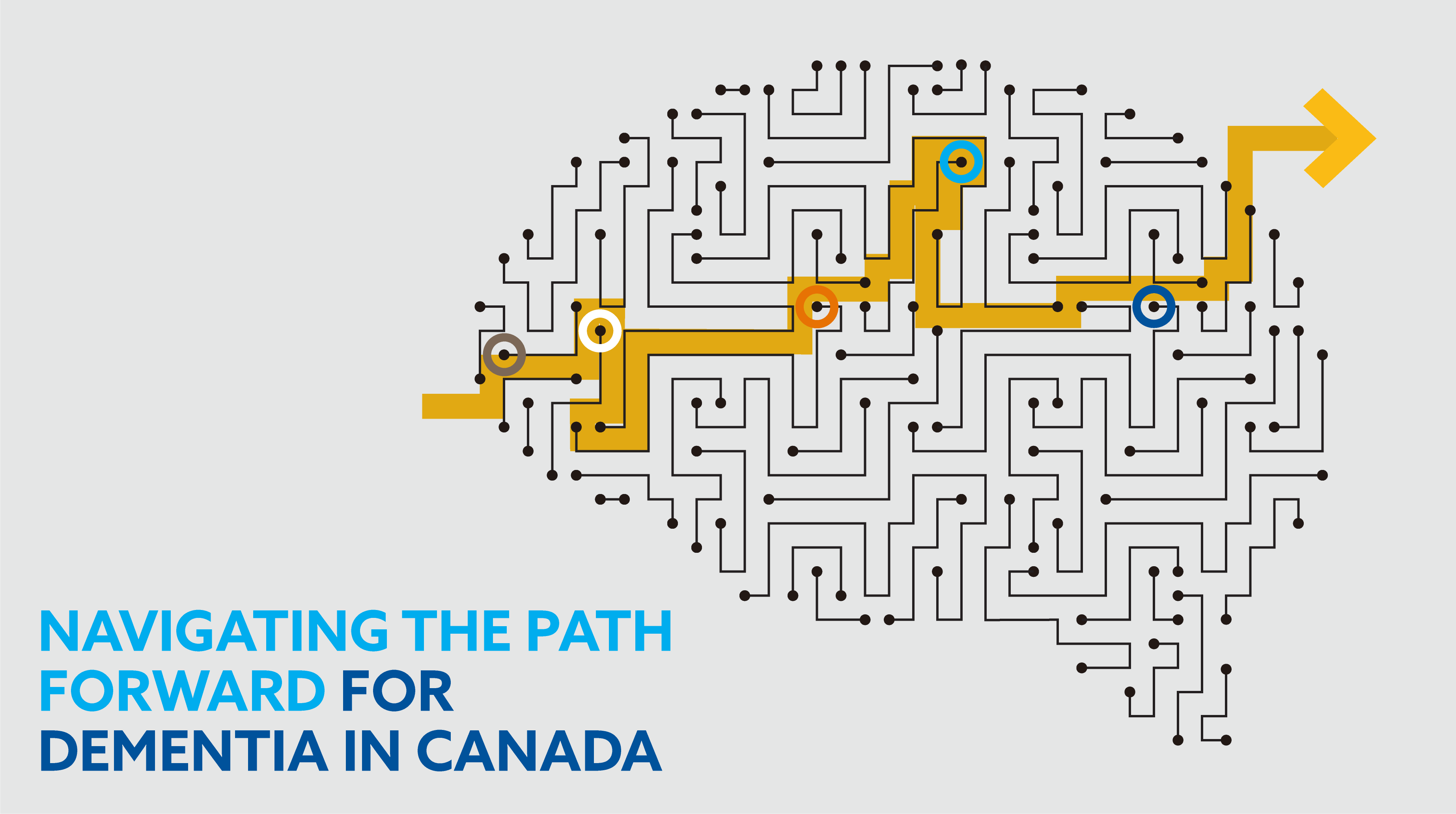Around the world, the scientific community is devoting substantial effort and funding to dementia research. Researchers are looking for ways to prevent the disease, to improve quality of life for people living with dementia and to ultimately find a cure to eradicate the disease.
On this page:
- Landmark Study 2: The Many Faces of Dementia in Canada
- Alzheimer Society Research Program Awards
- Alzheimer Society of Manitoba Graduate Student Fellowship Award
- Landmark Study 1: Navigating the Path Forward
- Participate in Research
- Research Funding
The Many Faces of Dementia in Canada
 Dementia is a major public health problem in Canada and around the world, affecting millions of people. Research indicates significant variations in the risk of development, prevalence, clinical presentation, and health outcomes across various communities in Canada, including differences in ethnicity, race, sex, gender and age.
Dementia is a major public health problem in Canada and around the world, affecting millions of people. Research indicates significant variations in the risk of development, prevalence, clinical presentation, and health outcomes across various communities in Canada, including differences in ethnicity, race, sex, gender and age.
With the rapid rise of our aging population in Canada, this is one of the first studies that seeks to better understand the many faces of dementia, so that no one is left behind and we’re able to serve their specific needs and those in their circle of care.
Understanding the unique needs and experiences of diverse communities is a key step in improving the quality of life for people living with dementia and their caregivers.
Click here to view the full report
Click here to view the Provincial Data Report for Manitoba
Alzheimer Society Research Program Awards 2023-2024
The 2023-2024 Alzheimer Society Research Program (ASRP) is pleased to announce it has awarded nearly $6 million to 44 researchers across the country to advance research related to all forms of dementia and find more effective means to diagnose, treat and eventually stop the disease, as well as improve day-to-day life and care.
The two Manitoban researchers receiving funding this year, both generously co-funded by Research Manitoba, are:
Eftekhar Eftekharpour, University of Manitoba

Title: Examination of neuronal nuclear damage as a new player in pathology of Alzheimer’s disease
Award/Grant: Proof of Concept Grant
Biomedical research efforts into Alzheimer’s disease have mostly focused on removing amyloid plaques, which are thought to be the main contributor to nerve-cell death. Some have proposed that these plaques are the result of other important systems malfunctioning.
Researchers have found, for instance, that the nerve-cell nucleus is severely damaged in the brains of people who have had Alzheimer’s disease. And a decreased level of thioredoxin (an antioxidant protein) can cause nuclear damage and change gene expression.
This study will test a potential antioxidant drug in a mouse model. This experimental drug is a small molecule than can enter the brain. If successful, this drug could be used for future clinical trials.
This research will also show whether using this antioxidant drug in early stages of Alzheimer’s disease may be protective for nerve cells.
Tiina Kauppinen, University of Manitoba

Title:NUDT5 as a therapeutic target in Alzheimer’s disease
Award/Grant: Proof of Concept Grant
This study aims to look at a pathway to possible slowing or stopping of Alzheimer’s disease progression. The pathway this study is looking at is chronic inflammation. Chronic inflammation is bad for brain cell function.
This research will focus on an enzyme called NUDT5. NUDT5 plays a prominent role in inflammatory signaling that exacerbates neurodegeneration in people with Alzheimer’s disease.
So far, this research team has developed a way of inhibiting the action of NUDT5. This method targets inflammatory pathways without toxic side effects.
In this study, the team will explore how this enzyme inhibitor could reduce cellular changes and slow memory deficits in a mouse model of Alzheimer’s disease.
Click here to find out more about ASRP, funded researchers, research news and accountability reports.
Click here to find out how to apply for ASRP Grants.
Alzheimer Society of Manitoba Graduate Student Fellowship Award 2023-2024
Each year, the Alzheimer Society of Manitoba awards funding fellowships valued at $4,000 each to two graduate students who have demonstrated outstanding interest or commitment to dementia research.
These awards are offered to encourage graduate student interest in research in dementia. Specifically:
- to enhance knowledge about the cause, treatment, cure and effects of dementia in the biomedical and psychosocial domains
- to increase knowledge about the care of people living with dementia by formal and informal caregivers
- to encourage graduate student interest in dementia
- to stimulate graduate student research activity in dementia
The two graduate students receiving funding this year are:
- Rashmita Chatterjee – awarded for her research focusing on virtual reality as a tool to improve navigation for people living with dementia.
- Aneet Saran – awarded for her research on the use of motor imagery to improve motor planning, movement and muscle strength in people living with dementia.
To learn more about the Graduate Student Fellowship award and how to apply, visit the University of Manitoba website.
Navigating the Path Forward For Dementia in Canada
Canada needs bold action to head off an impending dementia care crisis. This report from the Alzheimer Society of Canada, released in September 2022, says actions to reduce risk have the potential to change the future of dementia in Canada — if governments act now.
Navigating the Path Forward for Dementia in Canada is the first volume of the Landmark Study, which represents the most significant update of the prevalence of dementia in Canada and its forecasted growth over the next 30 years.
Click here to read the full report
Click here to view the provincial findings for Manitoba
Participate in Research
Click here to find out how you can participate.
Click here for National studies looking for Canadians looking to participate.
Research Funding
Financial gifts directed towards research are crucial to help find better treatments and ultimately a cure for Alzheimer’s disease and other forms of dementia. Without proper funding, research breakthroughs go undiscovered.
Click here to make a donation today!



